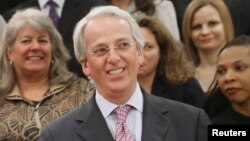About 600 delegates from 25 countries gathered in Chicago this week at the inaugural Chicago Forum on Global Cities, where they discussed challenges facing big cities as globalization spreads, from sustainability and architecture to security and technology.
“More people now live in urban areas than on rural land for the first time in history,” Ivo Daalder, president of the Chicago Council on Global Affairs, a forum co-host, told VOA. “And by 2050, almost two-thirds of the world population, almost 7 billion people, will be living in cities, so this is a big issue.”
Crime and security concerns are some of the big issues already facing many cities represented at the forum, which was held Wednesday through Friday. Gillian Tett, U.S. managing editor of the Financial Times, the other forum co-host, said the location of the forum illustrates some of those issues.
“In many ways, talking about this in Chicago is very apt and symbolic, because Chicago is a fantastic city, a vibrant city,” said Tett.
In many ways, she said, it's a city "that has been at the forefront of using technology and other innovations to create a healthier and safer environment. It is also a city which is also known as 'Chiraq' by some people — most notably and controversially, [film director] Spike Lee — because its murder rate, particularly in the south side, has been so high.”
A panel discussion that Tett led, "Safer Cities: Security and Vulnerability,” brought together global policing and security consultants who talked about lessons learned during recent events in the cities where they work — including Boston, where Edward Davis served as police commissioner during the Boston Marathon bombings.
“We used crowdsourcing in the marathon investigation,” Davis told the audience. “It was the community who stepped up and not only gave us information on the suspects, but they also actually found the suspects in that final day in Watertown.”
Former INTERPOL President Khoo Boon Hui connected his home of Singapore to the Bali terrorist attack in 2002.
“When Bali occurred, it was a great tragedy because over 200 people died. But Bali was 'Plan B,' " he explained. “ 'Plan A' was to attack Singapore. But we fought that because we put people on guard, and they didn’t want to risk coming to Singapore.”
Delegates touched on a wide range of topics during 18 different discussions at different venues throughout Chicago over the three-day event.
Former U.S. Treasury Secretary Henry Paulson joined the opening program, “Global Cities Driving the Global Economy,” while former U.S. Secretary of State Madeleine Albright participated in the final discussion of the event, “The Foreign Policy of Cities.”
Daalder, who helped organize the forum, said the event was an extension of the efforts of the Chicago Council’s Global Cities project, which seeks to address problems ranging from food security to immigration.
“We want to concentrate on what we call the four pillars of urban life — commerce and the economy, civics and the society, art and culture, and education — and try to bring leaders of all of those pillars together to have discussions that are integrated,” he said.





